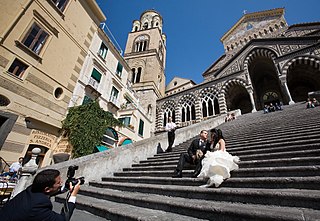
From the earliest days of the Christian faith, Christians have viewed marriage as a divinely blessed, lifelong, monogamous union between a man and a woman. However, while many Christians might agree with the traditional definition, the terminology and theological views of marriage have varied through time in different countries, and among Christian denominations.

Joanna Trollope is an English writer. She has also written under the pseudonym of Caroline Harvey. Her novel Parson Harding's Daughter won in 1980 the Romantic Novel of the Year Award by the Romantic Novelists' Association.
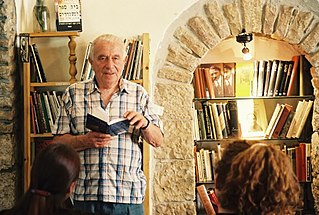
Yehuda Amichai was an Israeli poet and author, one of the first to write in colloquial Hebrew in modern times.

Cloudstreet is a novel by Australian writer Tim Winton published in 1991. It chronicles the lives of two working-class families, the Pickles and the Lambs, who come to live together in a large house called Cloudstreet in Perth, Western Australia, over a period of twenty years, 1943 to 1963. The novel received several awards, including a Miles Franklin Award in 1992, and has been adapted into various forms, including a stage play and a television miniseries.
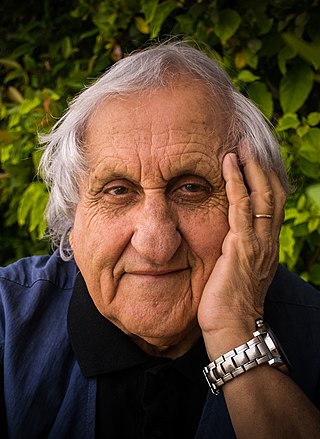
Avraham Gabriel Yehoshua was an Israeli novelist, essayist, and playwright. The New York Times called him the "Israeli Faulkner". Underlying themes in Yehoshua's work are Jewish identity, the tense relations with non-Jews, the conflict between the older and younger generations, and the clash between religion and politics.

Elective Affinities, also translated under the title Kindred by Choice, is the third novel by Johann Wolfgang Goethe, published in 1809. Situated around the city of Weimar, the book relates the story of Eduard and Charlotte, an aristocratic couple enjoying an idyllic but somewhat mundane life on a secluded estate; although it is the second marriage for both, their relationship deteriorates after they invite Eduard's friend Captain Otto and Charlotte's orphaned niece, Ottilie, to live with them in their mansion. The invitation to Ottilie and the Captain is described as an "experiment", as it indeed is. The house and its surrounding gardens are described as "a chemical retort in which the human elements are brought together for the reader to observe the resulting reaction." As if in a chemical reaction, each of the spouses experiences a strong new attraction, which is reciprocated: Charlotte, who represents reason, to the sensible and energetic Captain Otto; the impulsive and passionate Eduard to the adolescent and charming Ottilie. The conflict between passion and reason leads to chaos and ultimately to a tragic end.
Assia Esther Wevill was a German Jewish woman who escaped the Nazis at the beginning of World War II and emigrated to Palestine, via Italy, then later England, where she had an affair with the English poet Ted Hughes. While she was a successful advertising copywriter and a talented translator of poetry, she is mainly remembered in the context of her relationships with Sylvia Plath and Hughes.
Divorce according to Islamic law can occur in a variety of forms, some initiated by the husband and some by the wife. The main categories of Islamic customary law are talaq, khulʿ and faskh. Historically, the rules of divorce were governed by sharia, as interpreted by traditional Islamic jurisprudence, though they differed depending on the legal school, and historical practices sometimes diverged from legal theory.

Hebrew literature consists of ancient, medieval, and modern writings in the Hebrew language. It is one of the primary forms of Jewish literature, though there have been cases of literature written in Hebrew by non-Jews. Hebrew literature was produced in many different parts of the world throughout the medieval and modern eras, while contemporary Hebrew literature is largely Israeli literature. In 1966, Agnon won the Nobel Prize for Literature for novels and short stories that employ a unique blend of biblical, Talmudic and modern Hebrew, making him the first Hebrew writer to receive this award.
Biala is a Hasidic dynasty originating from the city of Biała Rawska, where it was founded by R. Yaakov Yitzchak Rabinowicz (II). Biala is a branch of Peshischa Hasidism, as R. Yaakov Yitzchak Rabinowicz (II) was the great-grandson of R. Yaakov Yitzchak Rabinowicz, the first Peshischa Rebbe. The dynasty was originally spread throughout many towns in Poland, often taking the names of said towns. However, after the Holocaust, the name "Biala" become synonymous with the entire dynasty. Today the dynasty is mostly concentrated in Israel, America and Switzerland.

Moshe Yehoshua Yehuda Leib Diskin (1818–1898), also known as the Maharil Diskin, was a leading rabbi, Talmudist, and Biblical commentator. He served as a rabbi in Łomża, Mezritch, Kovno, Shklov, Brisk, and, finally, Jerusalem, after moving to Eretz Yisrael in 1878. He opened what today is known as the Diskin Orphan Home in 1881.
Hillel Halkin is an American-born Israeli translator, biographer, literary critic, and novelist who has lived in Israel since 1970.

A mistress is a woman who is in a relatively long-term sexual and romantic relationship with someone who is married to a different person.
The type, functions, and characteristics of marriage vary from culture to culture, and can change over time. In general there are two types: civil marriage and religious marriage, and typically marriages employ a combination of both. Marriages between people of differing religions are called interfaith marriages, while marital conversion, a more controversial concept than interfaith marriage, refers to the religious conversion of one partner to the other's religion for sake of satisfying a religious requirement.

Cécilia María Sara Isabel Attias was the second wife of French president Nicolas Sarkozy until October 2007.

The Juggler is a 1953 drama film starring Kirk Douglas as a survivor of the Holocaust. The screenplay was adapted by Michael Blankfort from his novel of the same name. It was the first American feature film that was made in Israel.
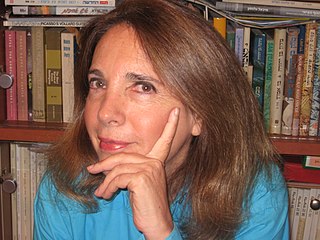
Nitza Ben-Dov is Professor of Hebrew and Comparative Literature at the University of Haifa. Winner of the 2021 Israel Prize

Yehuda Liebes is an Israeli academic and scholar. He is the Gershom Scholem Professor Emeritus of Kabbalah at the Hebrew University of Jerusalem. He is considered a leading scholar of Kabbalah; his other research interests include Jewish myth, Sabbateanism, and the links between Judaism and ancient Greek religion, Christianity, and Islam. He is the recipient of the 1997 Bialik Prize, the 1999 Gershom Scholem Prize for Kabbalah Research, the 2006 EMET Prize for Art, Science and Culture, and the 2017 Israel Prize in Jewish thought.
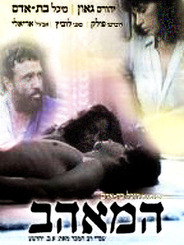
The Lover is a 1986 Israeli drama film, directed by Michal Bat-Adam. It is based on the 1977 novel of the same name by A. B. Yehoshua. Bat-Adam also starred in the film, alongside Yehoram Gaon, and wrote the screenplay in collaboration with Tzvika Kertzner.
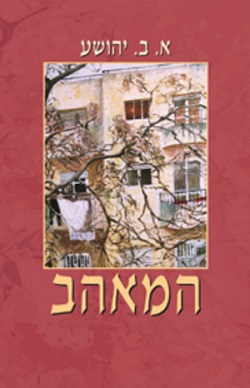
The Lover is the debut novel by A. B. Yehoshua, originally published in Hebrew in 1977. The book has been translated into 23 languages, and has been adapted for the screen twice. Written from the point of view of each of the six main characters, the book explores themes of adultery, war, Israeli national identity, and diaspora.















